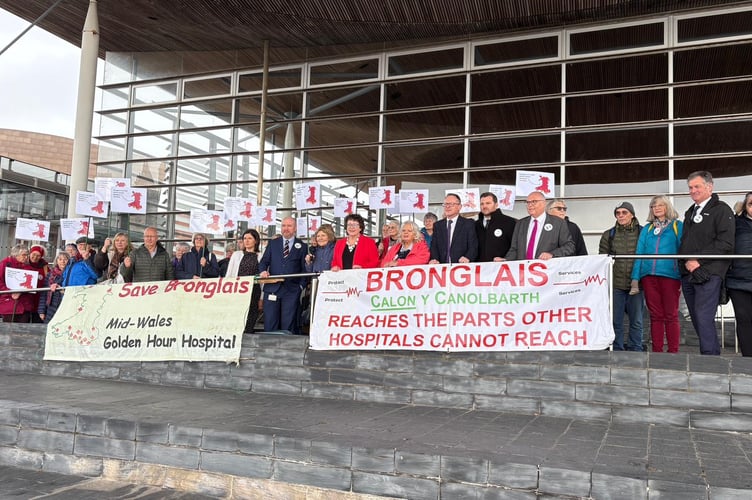JEREMY MILES is the 14th - out of 30 - sitting Labour MSs to say they won’t be standing in next year’s Senedd election. Consider that figure, and feed in the Caerffili bloodbath, and the suggestion of a quickening undercurrent of capitulation in Welsh Labour ranks is overwhelming.
The health secretary is usually seen as a radical who keenly supports gay rights, as the driving force, too, behind a landmark Supreme Court victory over Boris Johnson’s 2019 unlawful suspension of parliament. So why was he apparently so out of sympathy with citizen entitlement during the long-awaited Senedd debate over the dire threat to the Bronglais Hospital stroke service?
What happened to the sensitive politician championing equal rights for trans people, who had the steeliness to take on the UK government to repel a gross assault on democracy? Vanished without trace?
Wooden in his unquestioning support for the health board’s rigid and unreasonable adherence to its potentially lethal treat-and-transfer strategy, Miles countered the passion and cogency of cross-party MS condemnation of the plan with iterations that were without detectable empathy.
Surely he must recognise research-backed warnings of the high-risk outlook for midwest Wales stroke victims if the health board gets its way? Does he not worry about loss of families’ and friends’ emotional and practical support for patients shipped off to remote corners of south and west Wales?
His rebuttals of the fire-and-fury and well-informed good sense of Labour, Lib-Dem, Plaid Cymru and Tory members were flat and limited in scope. Where was the usually sharply focused Miles in the following: “The (stroke) services in their current configuration are not providing the best outcomes for patients, despite the efforts of NHS staff, and they are not sustainable.” Nowhere within sight, it appeared.
Is the health secretary now just winding down? Does he see a sunnier future beckoning, with the next seven months before his departure at the May election as basically a block of time to be got through? Who knows? All that matters is the well-being of patients.

Where are the MSs when they’re needed?
VIGOROUS cross-party hostility to the insane government-backed health board plan to downgrade the stroke unit was always going to be bolstered, or weakened, depending on strength of feeling at the Senedd debate.
If few MSs attended, Jeremy Miles would inevitably get an easier ride than if he faced a barrage of flak from multiple points on the political compass.
He might be expected to survive a guaranteed assault by the massed ranks of mid and west Wales members, but expose him to possible extra pressure from sundry other MSs from other parts of the country and his rigid adherence to the health board’s dangerous treat-and-transfer strategy could conceivably falter.
So it was disappointing that on the day of the debate the chamber fairly echoed with absences. At a rough count, just nine of 60 seats were occupied, although that number later fell to about six. Compare this with an attendance of about 24 at the previous day’s plenary session. Or at other recent plenaries, when MS numbers were all well into double figures.
Meanwhile, out of sight on Senedd TV were the scores of people in the public gallery who had taken the trouble to traipse down to Cardiff Bay to register their outrage at this prospective wielding of the joint health board/government wrecking-ball. (Why actually did the Senedd video-camera not bring them into the picture?)
In the event, this was a one-sided debate. The health secretary cut an isolated figure on the receiving end of compelling arguments from regional MSs to basically leave this finely performing stroke unit unmolested, and in addition to develop it into a major regional facility.
But it sometimes felt that, for Miles, it may have been in one ear and out the other. His rebuttals were predictable and left doubt that he had engaged thoroughly with points put forward by the other side. Whether about well researched warnings on risks to patients built into the discredited treat-and-transfer model, or the practical impossibility of expecting families and friends to navigate vast distances to Llanelli or Haverfordwest, and back, to bring comfort and support to frightened patients immersed in shattering crisis.
Gwynedd council’s plucky independence streak
GWYNEDD council shows gritty independence of thinking over its refusal of planning permission for an array of photovoltaic panels spread across two fields of top quality farmland near Llanbedrog.
Plucky because the authority knows it will be seen as defying current government orthodoxy in both Cardiff and London, where unquestioned backing for renewables installations anywhere and everywhere is the new and forceful norm.
Before Llanbedrog, councillors on Ynys Môn sought a judicial review after the Welsh government backed a large solar installation which would, again, blot out a vast area of farmland. In England, meanwhile, the net zero zealot and energy minister Ed Miliband gives his blessing to the obliteration of hundreds of thousands of acres of prime food-growing land in Lincolnshire.
Food-security is at the heart of many objections to grand-scale solar. Already, grain output from East Anglia - once known as Britain’s (and Wales’s) breadbasket - is in significant decline. Central to North Wales protests against big solar is food-production loss, in addition to landscape-ruination.
But food-versus-energy antagonism is unnecessary. Espousing renewables needn’t involve eliminating vast stretches of prime farmland.
Fortunately, from 2027, solar panels will be compulsory for almost all new-builds, with house-builders obliged to install them on most new homes.
This has come late in the day. Solar extremists should now draw breath and put their energy into promoting retro-fitting. That is, unless they really think food comes from supermarkets.





Comments
This article has no comments yet. Be the first to leave a comment.